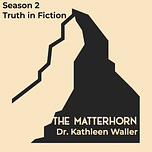How can a frame narration provide both further truths and spark unreliability?
What is the effect of only reading one side to a story?
How do people change stories once they retell the narrative in their own words?
Today’s podcast is part of a series on the conceptual topic of letter writing. You can also listen to the podcast via Apple or Spotify or in the Substack app. A full AI-generated transcript can be accessed on the desktop version.
For these eight weeks, I’ll bring you texts related to this topic. This series is an experiment for a new podcast season that I recorded to sync up with the holiday letter season and the epistolary form of my latest novel. Stay tuned for more fiction, word sketches, and cultural essays in 2025.
I’d love to hear what you think in the comments. Feel free to ask questions or share text ideas, even your own writing. Thank you!
Keywords:
Frame narration
Reliability
Mise-en-abyme
Ambition
Relationships
Letters as proof / news
Excerpt from Chapter 24 of Mary Shelley’s Frankenstein:
September 2d.
I write to you, encompassed by peril and ignorant whether I am ever doomed to see again dear England and the dearer friends that inhabit it. I am surrounded by mountains of ice which admit of no escape and threaten every moment to crush my vessel. The brave fellows whom I have persuaded to be my companions look towards me for aid, but I have none to bestow. There is something terribly appalling in our situation, yet my courage and hopes do not desert me. Yet it is terrible to reflect that the lives of all these men are endangered through me. If we are lost, my mad schemes are the cause.
And what, Margaret, will be the state of your mind? You will not hear of my destruction, and you will anxiously await my return. Years will pass, and you will have visitings of despair and yet be tortured by hope. Oh! My beloved sister, the sickening failing of your heart-felt expectations is, in prospect, more terrible to me than my own death. But you have a husband and lovely children; you may be happy. Heaven bless you and make you so!
My unfortunate guest regards me with the tenderest compassion. He endeavours to fill me with hope and talks as if life were a possession which he valued. He reminds me how often the same accidents have happened to other navigators who have attempted this sea, and in spite of myself, he fills me with cheerful auguries. Even the sailors feel the power of his eloquence; when he speaks, they no longer despair; he rouses their energies, and while they hear his voice they believe these vast mountains of ice are mole-hills which will vanish before the resolutions of man. These feelings are transitory; each day of expectation delayed fills them with fear, and I almost dread a mutiny caused by this despair.
Texts:
Frankenstein, or the Modern Prometheus (free on Gutenberg)
Frankenstein through Mary Shelley’s Letters (Criticism, JStor)
Narratives of Seduction and the Seductions of Narrative: The Frame Structure of Frankenstein (ELH, JStor)
My discussion of doubles and the uncanny, with mention of Frankenstein
My discussion of adaptation, with mention of Frankenstein















Share this post